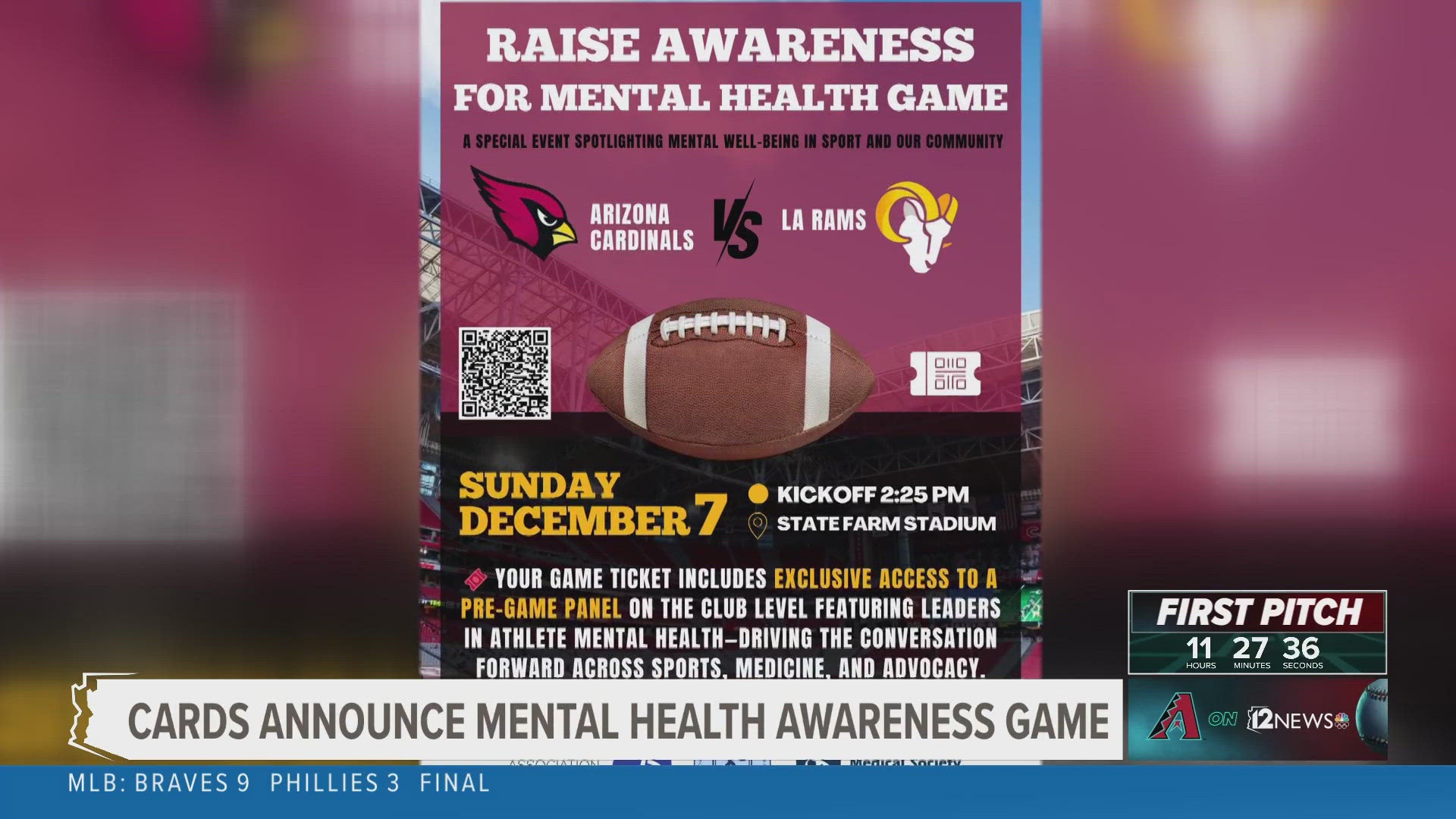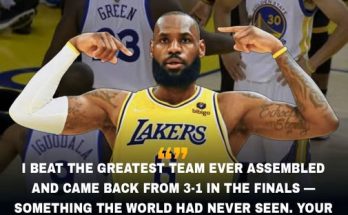The Arizona Cardinals are taking a bold and meaningful step forward this season as they prepare to host their first-ever Mental Health Awareness Game, a momentous initiative that highlights the NFL franchise’s commitment to the emotional and psychological well-being of its players, fans, and broader community. At a time when mental health conversations are finally earning a well-deserved place on national platforms, the Cardinals are sending a clear message: the battle for mental wellness deserves just as much attention and energy as the battle for victories on the field.
Scheduled to be part of the upcoming NFL regular season, the event will feature a range of initiatives aimed at raising awareness, promoting open dialogue, and providing resources for those grappling with mental health challenges. From players donning custom cleats and helmet decals to on-field presentations and community outreach programs, the Cardinals are ensuring this isn’t just another themed game—it’s a true statement of values.
For decades, mental health was a silent struggle within professional sports. Athletes were taught to grit their teeth, to fight through pain—physical or mental—and to project strength at all costs. But today, the paradigm is shifting, and the Arizona Cardinals are helping to lead that cultural change. This upcoming Mental Health Awareness Game will not only honor those who have fought silent battles but also empower those currently navigating them to seek help without shame or stigma.
Sources close to the organization indicate that the game will include tributes to mental health advocates and personal stories from players and coaches who’ve faced their own mental health struggles. These candid testimonials are expected to play a central role in normalizing conversations that, for too long, were considered taboo in the locker room and in the stands. The Cardinals believe that visibility and vulnerability go hand-in-hand—and that by allowing players to open up about their journeys, others will feel emboldened to confront their own struggles.
Beyond the spotlight of gameday, the Cardinals are taking steps to ensure their commitment has deep and lasting roots. In partnership with local mental health organizations and national advocacy groups, the team plans to launch educational campaigns in Arizona schools, provide training for coaches and youth mentors, and fund mental health services for underserved communities. The initiative is being described not as a one-off PR gesture, but as the beginning of a long-term commitment that aligns with the franchise’s broader community-first mission.
General Manager Monti Ossenfort and Head Coach Jonathan Gannon have both expressed their deep support for the initiative, emphasizing that mental health is not just a concern for fans—it’s a vital issue within the team as well. Both men have prioritized building a culture where emotional resilience is as valued as physical strength, and where seeking help is seen as an act of courage, not weakness. As one front office source put it, “We want to build champions on and off the field. That includes making sure our people are mentally and emotionally healthy. You can’t perform at your best if you’re carrying an invisible weight.”
One of the most powerful voices in the Cardinals’ locker room is that of Pro Bowl safety Budda Baker, who has spoken openly in recent months about his own struggles with mental fatigue and the emotional toll of high-stakes performance. Baker’s transparency has sparked conversations across the league, and sources say he will play a central role in the Mental Health Awareness Game, possibly delivering a pregame address or being featured in a video segment played to the crowd. His leadership on this front underscores how seriously the players are taking the initiative—not just as a cause, but as a call to action.
Fans attending the game can expect a host of symbolic gestures meant to reinforce the message of the night. The stadium will be illuminated in green—the international color for mental health awareness—and fans will receive wristbands, towels, or pins to show their support. The team will also host a pregame resource fair, where local nonprofits and mental health professionals can connect directly with fans seeking guidance or assistance.
Even the halftime show is being designed to fit the theme. Instead of a traditional performance, the Cardinals will use that time to honor local heroes in the mental health field—therapists, social workers, educators, and advocates who’ve made a measurable difference in the lives of others. In spotlighting these individuals, the team hopes to elevate the idea that mental health professionals are as vital to a community’s strength as police officers, firefighters, or physicians.
The ripple effect of the Cardinals’ decision is already being felt across the league. Other NFL teams are reportedly taking note and exploring how they, too, can follow suit. With mental health issues impacting millions across the country—including countless fans in every stadium—it’s clear that the Cardinals are not just addressing a moment but creating a movement. By embracing vulnerability and prioritizing wellness, they are setting a new standard for what leadership looks like in professional sports.
Team owner Michael Bidwill has long advocated for community outreach and personal development, and this initiative fits squarely within that legacy. Bidwill, who has supported a number of mental health and addiction recovery causes in the past, sees the Mental Health Awareness Game as a natural extension of the team’s responsibility to its city and its fanbase. “We’re more than just a football team,” Bidwill recently said. “We’re part of this community. And if we can use our platform to save even one life, to help even one person feel seen and supported, then we’ve done something truly meaningful.”
The announcement of the game has already generated a groundswell of support from across the Arizona community. Mental health advocates, school administrators, and even local politicians have praised the Cardinals for using their platform in such a meaningful way. Social media has also been buzzing, with fans expressing admiration and gratitude for the team’s willingness to take on such a personal and important issue. Some fans have even shared their own stories of loss, struggle, and survival—proof that the initiative is already resonating deeply.
The NFL, for its part, has also expressed support for the Cardinals’ move. In recent years, the league has launched its own mental health initiatives, including the “My Cause, My Cleats” campaign and partnerships with organizations like Mental Health America and the American Foundation for Suicide Prevention. The Cardinals’ game adds momentum to that league-wide push, and could pave the way for other teams to designate their own Mental Health Awareness Games in future seasons.
As the date of the event approaches, expectations continue to grow—not just for a great game of football, but for a transformative experience that leaves a lasting imprint on all who attend. The Cardinals are inviting their fans not just to watch the game, but to join a conversation that could help rewrite the way we think about strength, vulnerability, and healing. They are saying, in no uncertain terms, that mental health matters—and that in the Arizona Cardinals organization, no one has to struggle alone.
In a league where toughness is revered and weakness often goes unspoken, the Arizona Cardinals are changing the narrative. They are proving that true strength lies in honesty, empathy, and the courage to stand up for what’s right—even when it’s hard. The first-ever Mental Health Awareness Game will be more than a sporting event. It will be a beacon of hope, a rallying cry for change, and a powerful reminder that behind every helmet is a human being, worthy of care, compassion, and understanding.
The Arizona Cardinals are not just hosting a game. They are starting a movement—and the impact could echo far beyond the final whistle.



